There is a lot of controversy over vaccines today. What is clear that the number and rate of vaccinations around the world grew rapidly and this was very profitable for the pharmaceutical companies that produce them. It has been reported that vaccination rates are falling around the world and this reduces the profit margins of the pharmaceutical industry.
One of the topics often raised by those who push the narrative of vaccinating our population is the concept of herd immunity. I have been struggling to understand this topic and I want to share my thoughts with you.

What Is Herd Immunity?
According to Google herd immunity is defined as:
The resistance to the spread of a contagious disease within a population that results if a sufficiently high proportion of individuals are immune to the disease, especially through vaccination.
"the level of vaccination needed to achieve herd immunity varies by disease but ranges from 83 to 94 percent"
The theory is that if a significant proportion of our community is vaccinated for a particular disease (83-94 %) then the disease will not be able to spread throughout the rest of the unvaccinated population will not be large enough for that disease to spread.
This seems like a logical argument initially and if implemented will clearly be very profitable for the pharmaceutical industry. However upon further deliberation there are elements of this theory that don't make sense to me. Perhaps you can help me understand herd immunity better!

Medical Corruption
From my posts it is clear that I believe the pharmaceutical industry is very corrupt and I have lived experiences that have proved this to me. Previously I have posted on:
- My own experiences corrupting doctors for the pharmaceutical industry
- The rise in the rate and volume of vaccinations in Australia
- Pharmaceutical companies hosting 30,000 doctor events every year in Australia
So it is not surprising that I want to analyze everything the information they release and approach the subject with skepticism!

The Australian Standard Vaccination Schedule
I have already discussed this in a previous post but I think it is worth raising some salient points about the growing number of vaccinations included in our national schedules. To take Australia as an example by the time a child is 1 year old it seems that they would have been vaccinated with concoctions that include 32 different vaccinations. By the time an Australian is 70 years old the national vaccination schedule dictates that they should have been vaccinated for diseases over 98 times!
Here is the Australian Standard Vaccination Schedule for every man woman and child (I apologize for how many there are!):
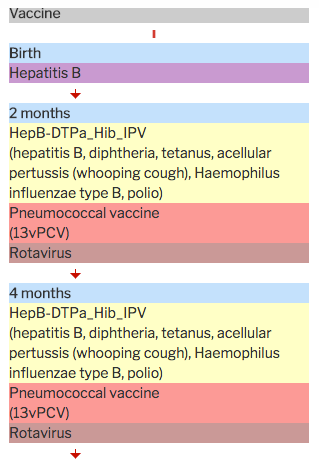
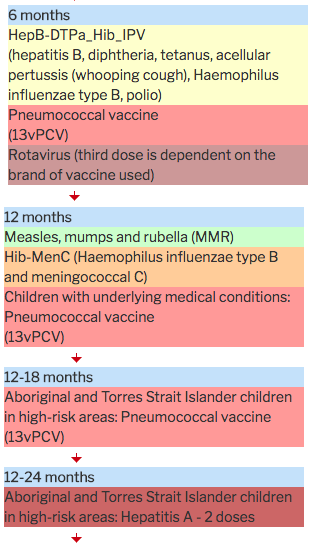
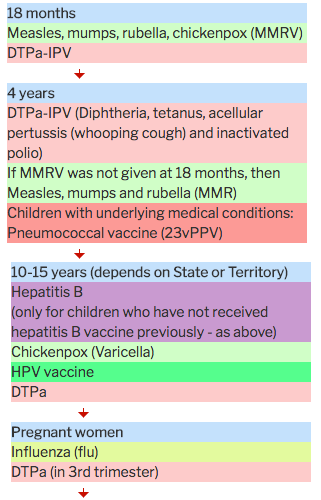
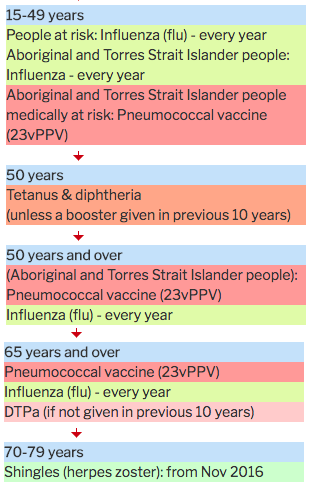
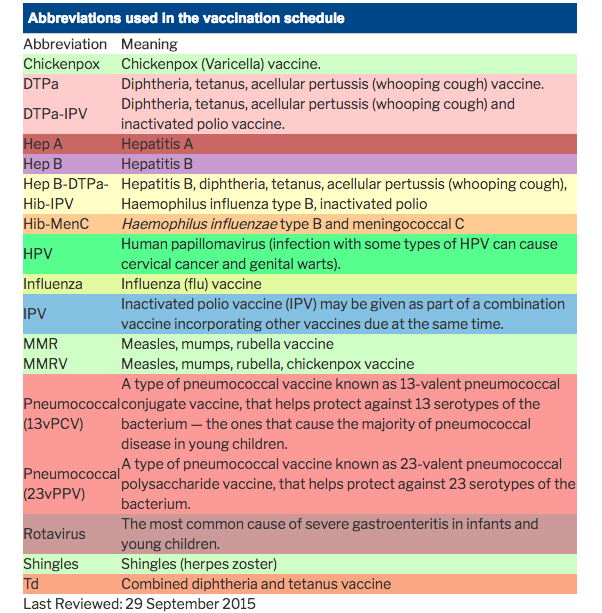
I got this chart from here.
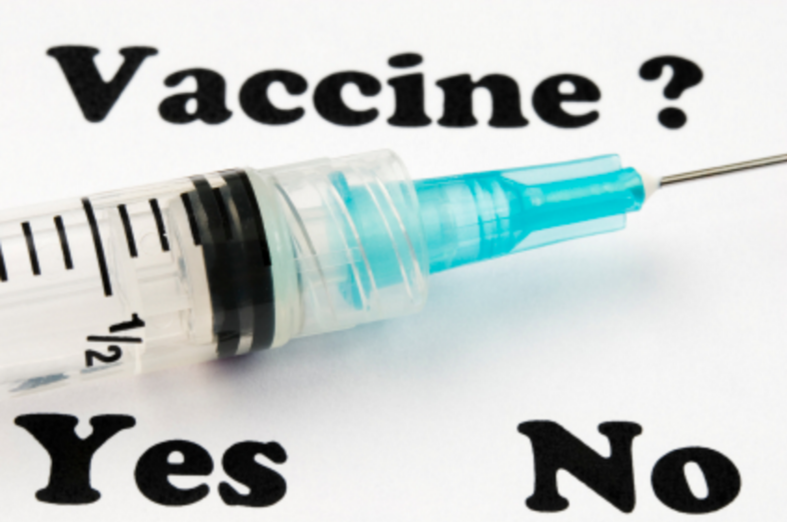
Why Herd Immunity Doesn't Make Sense To Me!
In my previous posts I was told by pro vaccination commenters several times about herd immunity and how important it is to achieve. However when I began to look into the subject things did not seem to add up.
Firstly there is the issue of tourism. If the percentage of a population that needs to be vaccinated to achieve herd immunity is 83-94% how does the yearly influx of tourism into countries impact this concept. Lets look at a few examples:
Australia: Australia's population is 24 million people and in 2015 Australia received 7.4 million visitors. This equates to approximately 30% of Australia's population arriving during the course of 12 months. Flying regularly in and out of Australia I know that visitors are not vaccinated or checked for vaccinations on arrival.
UK: The UK has a population of 65.6 million people and in 2015 had 36 million visitors. This equates to an influx of over 50% of the population over the course of 12 months. I know visitors to the UK are not vaccinated or checked for vaccinations on arrival.
US: The US has a population of 323 million people and in 2014 75 million people arrived as tourists. This equates to about 23% of the population arriving over a 12 month period.
These figures do not even take into account illegal immigration statistics.
These statistics do not match the necessary vaccination threshold for herd immunity of 83-94% of the population. I am not aware of any country which checks vaccinations or insists on vaccinating new visitors. An approach like this would surely have a negative impact on the lucrative tourism industries.

What Does This Mean For The Concept Of Herd Immunity?
The statistics above are very telling and does not fit within the concept of herd immunity. When I have posed this question to the Steemit community I was provided two answers:
Australia is considered an affluent country so people coming to Australia must be rich and therefore vaccinated. As a frequent visitor to Australia I can attest that there are full planes arriving daily from places where are not considered so affluent such as India, China and Indonesia.
Tourists are spending time in tourist destinations and are not mixing with the majority of Australians. This also doesn't make sense to me as although Australia is large 85% of the population lives within 50KM of the coast. These are also where the many of the major tourist destinations are.
As I am very interested in this topic I am keen to hear from anyone in the Steemit community who can shed some light on herd immunity!
Images courtesy of: 1, 2, 3, 4, 5.
Jockey loves you All - vaccinated or not!

Well done for opening this contoversial topic up in a peaceful manner (many don't!!)
An issue I have in particular with herd immunity is the adult population. All vaccine schedules target babies and childen but adult boosters seem to be rarely followed up. By the admission of the manufacturers, not all - if any vaccines provide life long immunity. What does this mean for herd immunity if only children are up to date on their vaccines? Does herd immunity even exist or is it just another myth?
Downvoting a post can decrease pending rewards and make it less visible. Common reasons:
Submit
Excellent point! My intuition is that herd immunity may be a marketing tactic! Upvoted! =)
Downvoting a post can decrease pending rewards and make it less visible. Common reasons:
Submit
Immunity is the strong form of resistance.
Even if you are no longer immune, you are still more resistant to the disease and your body reacts faster to it, too.
Still grown-ups should do what the doctors says, too!
Downvoting a post can decrease pending rewards and make it less visible. Common reasons:
Submit
There is also the fact that vaccines do not protect 100% of time, more like 40% to 80% depending on the vaccine, and the people vaccinated can be the cause of spreading a disease.
Downvoting a post can decrease pending rewards and make it less visible. Common reasons:
Submit
Yup, good post. Also, the immunity conferred by a vaccine drops over time (that's why there's booster shots....kerching!). An adult that hasn't been vaccinated in 20 years won't have immunity to lots of the diseases he was vaccinated for as a kid.... so 'the herd' is waaaaaaay below the supposed necessary levels & yet doesn't have massive out breaks of the diseases. Herd immunity, mah I don't buy it.
Downvoting a post can decrease pending rewards and make it less visible. Common reasons:
Submit
Unless you re-define what "immunity" is, the idea of herd immunity is an admission as to the ineffectiveness of vaccines.
You can't have it both ways, either vaccines are effective or they're not. If you can't decisively tell someone that they will be immune after a vaccination, you're selling snake oil.
How about a completely unbiased clinical trial (funded by big pharma) that compares the placebo effect to vaccine effectiveness?
The fact of the matter is that disease transmission began to decline when people realized that you shouldn't shit where you eat & you should wash your hands.
But big pharma can't make obscene profits by providing clean water to people and teaching them how to prevent the spread of disease through proper sanitation though so that's not going to happen anytime soon.
Downvoting a post can decrease pending rewards and make it less visible. Common reasons:
Submit
No, not 30% but about 1% since the tourists are not there for the whole year, right?
Most tourists stay 1-2 weeks (and often tourists are the ones getting the most vaccinations). And a lot of them are vaccinated.
But let's say the majority are not. That leaves you with 5 million people.
They are in the country for 1 week. Makes about 100K "year-people-equivalents".
Or halve a percent for the 24 million population.
Also tourists tend to be concentrated in one place, making an epidemic far less likely, but maybe concentrating sickness in hotels.
however most illnesses have a time (I don't know the english word) it takes from getting the virus yourself until the time you are able to infect another person.
So even if a tourist gets infected in your country he might already have left the country by the time she is dangerous.
Downvoting a post can decrease pending rewards and make it less visible. Common reasons:
Submit
Great point. Most tourists check with their doctors before visiting a foreign country to see what diseases are particularly prevalent and get vaccinated against them before travelling. This plus the fact that the number of tourists is very low in comparison to actual residents means herd immunity may probably not be affected that much. However the article does make a good point that herd immunity could be influenced with a large number of visitors. I personally believe herd immunity is very important, and stops the spread of many infectious diseases.
Downvoting a post can decrease pending rewards and make it less visible. Common reasons:
Submit
I've been asking myself the same questions that you have but I haven't looked into it yet as I'm tied up with other research.
I'd be really interested for you to take this one step further and I'd love to see the results. For example:
Cairns - Great Barrier Reef
On average 25% of Cairns population are tourists at any given time. I would think that the number would be higher during the non-monsoonal months but I have not checked. You might find that the percentage is much higher during certain months. Again, not sure if this number includes domestic tourists or not (that requires more research).
N.B: Going one step further again you could break it down into age groups and diseases. No need for that to begin with but if you're first findings can show that we are already below the herd immunity rate it might be worth delving deeper.
You may find that the numbers blow the herd immunity theory out of the window?
I know that this is a fair bit of work, but I think that it is important work. Someone else may have already done some research on to it that you can piggy-back off?
I would start with countries that have low vaccine rates and cross check them with the tourism numbers from those countries - you might find some quick wins there e.g. China, India etc.
I hope that you, or someone else can make time to look into this. The results will be very interesting to see.
Thank you for this post and well done!
Downvoting a post can decrease pending rewards and make it less visible. Common reasons:
Submit
No, because reality is more complicated like that what you want to construct.
btw, I have written it above: tourists are likely to be better vaccinated then the people they visit.
Also, if you remember that for certain illnesses the vaccination rate in the whole world is above 80%, the "tourist threat" does not seem that big, right?
Downvoting a post can decrease pending rewards and make it less visible. Common reasons:
Submit
Your intentions (and outcome) is very clear, it is simply not possible, even before you've seen the evidence - your mind is made up.
You haven't looked into the vaccination rates in Cairns, or the number of tourists that visit the city in the peak months - in fact you haven't looked at any of the metrics that I suggested.
I asked for more evidence and I will wait for it to come in before closing my mind.
Downvoting a post can decrease pending rewards and make it less visible. Common reasons:
Submit
I wrote at length on this a few days ago and despite the tired old BS claims that I am 'abusing science' by questioning it's application (lol) - NO-ONE provided proof of the existence of herd immunity.
I have heard numerous doctors say that herd immunity has never been proven and I found in my research that there are numerous definitions of it anyway.
The best evidence I have seen is that when enough people in a community are vaccinated, the incidence of disease may be reduced such that the remaining non vaccinated people are less likely to be sick. That is ONLY due to the reduced risk in them encountering someone who has an illness, it is not in any way because they themselves have developed a magical immunity through some kind of non physical immunity boost.
For the pro-vaccine groups the issue of tourism is only motivation to increase the vaccination of other countries.
All of this is neutralised by the reality that it is possible to modulate our own immune system via our own consciousness as proven by Wim Hof and additionally that it is well known that the average person is significantly lacking in important nutrients - thus their immunity is sub standard.
by increasing personal health we mitigate any potential benefit of vaccines and remove the known risk of vaccine injury too.
for insight into the nightmares that can arise from ignorance of vaccine science, check out my recent whistleblower post from uganda.
Downvoting a post can decrease pending rewards and make it less visible. Common reasons:
Submit
Congratulations, you have quoted the definition of herd immunity.
Downvoting a post can decrease pending rewards and make it less visible. Common reasons:
Submit
Known is not proven.
The average person should not lack, especially significantly, important nutrients. However it might be that the average US American does who only eats at the big red M.
If you are halfway - what do I say, quarter way - eat how the doctors say you should, then there is no reason, if you haven't an metabolism illness or are a vegan who is not very very attentive, to lack anything.
That is to say, even the Burger with a salad nominally gives you 99% of what you need.
Downvoting a post can decrease pending rewards and make it less visible. Common reasons:
Submit
The definition of 'known' to me is essentially 'proven'.
It is entirely possible for non vegans to be nutrient deficient and, in fact, the vast majority are deficient in dietary fibre for example - and some others. Equally, it is entirely possible for vegans to source all the nutrients they need. I suggest listening to Dr. Greger at nutrientfacts.org for more on that.
Downvoting a post can decrease pending rewards and make it less visible. Common reasons:
Submit
Possible is much. As I said, a vegan just has to be very careful, because there is no (natural) possiblities you get the stuff that is in meat. B12 for example. 75% do not take enough.
But the fibre thing is bullshit. There can be no deficiency because you don't need them. You may have a hurting stomach without it though - or with too much of it, which happens to a lot that listen to "more fibres more fibres!!"
It can be fully ok though in both extremes, that's a a very personal thing.
Either way the fibres are no essentials.
Downvoting a post can decrease pending rewards and make it less visible. Common reasons:
Submit
Vitamin B12 is entirely able to be sourced from a plant based diet. In fact, it has been stated by professional nutritional doctors that it is entirely incorrect to state that meat eaters are more able to typically source B12 than plant eaters - this is partially due to high levels of antibiotics typically found in commercial meat which affects the bacteria involved.
B12 is present in soil and on the surface of plants that have not been commercially processed.
You can claim that you don't need dietary fiber, that's fine - but the science disagree with you.
Downvoting a post can decrease pending rewards and make it less visible. Common reasons:
Submit
Yes, B12 can be found in plants, but not in those normally found in a western diet. That is why for example the Vegan society tells you to take supplements.
Again the japanese have it good here: nori algea have a lot of B12. shiitake a bit. So eat sushi ;) nori is really good stuff.
Downvoting a post can decrease pending rewards and make it less visible. Common reasons:
Submit
Unfortuantely, the ongoing fukushima disaster means that it is wise to avoid ingesting things from the ocean, particularly from asia.
The hypocrates institute in America runs nutritional education courses and make clear that the main issue for us is not so much in sourcing B12, but in absorbing and using it. That process is one which requires adequate amounts of other nutrients that many are lacking. Other doctors I have listened to have said that the idea that vegans cannot source B12 is based on old data which has been shown to be inaccurate with more modern scientific methods and equipment. None the less, we only need a tiny amount in a lifetime anyway, so a good vegan B12 supplement is simple enough to use and access. That said, there are several forms of B12 supplement and to my understanding, only one of them is actually beneficial - the ones typically found in supermarkets and other shops are not particularly effective and may even be counter productive.
As an aside, the only person I know that has been prescribed a B12 supplement is my dad and he is a meat eater who avoids fruits/vegetables.
Downvoting a post can decrease pending rewards and make it less visible. Common reasons:
Submit
Yes, the B12 absorption is problematic. Still it are 75% of vegans that have B12 problems, not 75% of meat eaters ;)
Regarding Fukushima I am not so sure. It depends wher the stuff gets transported and you get the nori from.
For the average ocean the bomb tests on the bikini islands etc. should provide more radiation then Fukushima.
btw. here in Germany it is still warned to eat more then once per week of fungi you got out from the woods. Some of them are still XX times more radioactive then the max. allowed (for stores) amount because of Chernobyl.
I don't know how good nori is in absorbing radioactive materials, but the shiitake are probably more dangerous.
Downvoting a post can decrease pending rewards and make it less visible. Common reasons:
Submit
Upvoted! I never questioned whether or not herd immunity is a real thing. But even if herd immunity does exist, and frankly I doubt the tourism point you made is enough to suspect otherwise, and even if vaccines were the greatest thing ever and clean and save and chocolate flavoured, I would still speak against any attempt to force them on people. But in that case it would probably not be necessary to make them mandatory anyway... You may be onto something, though, after all the point of herd immunity seems to be the only point in existence that only remotely makes sense. So making sure we actually check the basis for it is important.
Downvoting a post can decrease pending rewards and make it less visible. Common reasons:
Submit
Yup, the conversations get very emotional. If the vaccines really work there should be no issue: If you or your child are vaccinated against measles, for example, and the vaccines work, it doesn't matter how many people around you don't vaccinate and get the disease, you would be protected, so there would be no reason to be upset at people who choose not to vaccinate. And I haven't yet seen an example of, for example, a measles outbreak, where they report how many of the people who came down with the disease were vaccinated against it (and therefore should have been immune). A difficult and emotional topic. And a political one.
Downvoting a post can decrease pending rewards and make it less visible. Common reasons:
Submit